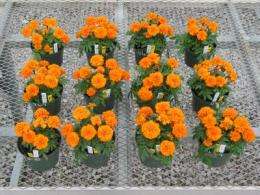Chicken litter provides organic alternative to synthetic fertilizers

Recent movements aimed at managing environmental impacts of agriculture have spurred interest in the development and use of organic and natural fertilizers for commercial applications. Many organic fertilizers are byproducts of livestock, fish, food, and other processing industries. In Mississippi, where the poultry industry produces more than 730 million broiler chickens each year, and annual chicken litter production is estimated at more than 730,000 tons, there is a naturally abundant supply of chicken litter available for fertilizer.
New research from scientists at Mississippi State University, in collaboration with the USDA-ARS Southern Agricultural Laboratory, investigated the effects of two non-composted broiler chicken litter-based organic fertilizers and one commonly used synthetic controlled-release fertilizer on marigold growth and flowering. The research study, published HortScience, indicated that some broiler litter-based fertilizers have the potential to be used as organic fertilizer sources for container production of marigolds in greenhouses.“Despite having lower nutrient concentrations than many synthetic fertilizers, similar broiler litter-based fertilizers have been shown to be effective plant fertilizers. For growers wishing to use these and other natural fertilizers in their production systems, the biggest question is how the fertilizers should be managed”, stated Guihong Bi, corresponding author of the study. “How litter-based fertilizer behaves in an actual greenhouse setting remains a significant question.”
The researchers conducted two experiments designed to evaluate the growth and flowering responses of greenhouse-grown French marigold (Tagetes patula L. ‘Janie Deep Orange’) to two non-composted broiler chicken litter-based organic fertilizers, 4–2–2 and 3–3–3, and one commonly used synthetic controlled-release fertilizer, 14–14–14. In both experiments, fertilizer 4–2–2 was applied at four rates of 1%, 2%, 4%, and 6% (by volume); 3–3–3 was applied at four rates of 1.34%, 2.67%, 5.34%, and 8.0% (by volume); and 14–14–14 was applied at rates of 0.99, 1.98, 3.96, and 5.94 kg/m3.
Results from the study indicated that broiler litter-based 4–2–2 and 3–3–3 have the potential to be used as organic fertilizer sources for container production of marigolds in greenhouses.
“For the organic fertilizer rates used in this study, in general, low to intermediate rates of 4–2–2 and 3–3–3 produced the highest plant growth index, shoot dry weight, number of flowers per plant, total flower dry weight, and root rating. Plants grown at high rates of 4–2–2 and 3–3–3 showed symptoms associated with excessive fertilization, including reduced plant growth, decreased root quality, and decreased number and dry weight of flowers.” According to the authors, the results are consistent with other studies that have shown excessive organic fertilizer depressed plant growth compared with lower fertility levels
The scientists advised growers to be cautious with the rate of fertilizer applied. “Because different crops may respond differently to these natural fertilizers, it is important for growers to test any new fertilizers before incorporating them into their production practices”, they noted.
More information: The complete study and abstract are available on the ASHS HortScience electronic journal web site:
Provided by American Society for Horticultural Science

















